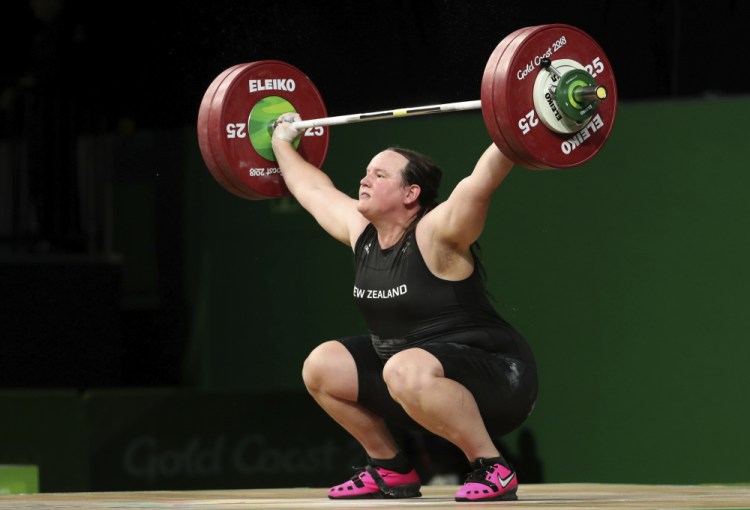When New Zealand weightlifter Laurel Hubbard began her transition in 2013, the International Olympic Committee didn’t have any guidelines about transgender women competing in the games.
Now, after eight years of toil and triumph in competitions – and amid significant conflict about the rules governing transgender athletes – Hubbard is the first openly transgender person selected to compete for a medal in the Olympics.
As one of five weightlifters selected for New Zealand’s team on Monday, the 43-year-old will also be the oldest weightlifter at this summer’s Tokyo games, three years after a broken arm nearly ended her career.
“I am grateful and humbled by the kindness and support that has been given to me by so many New Zealanders,” Hubbard said in a statement.
Chelsea Wolfe, another transgender athlete, will also head to Tokyo this summer as an alternate on the U.S. BMX freestyle team.
The selections come amid debate about whether transgender women hold unfair hormonal advantages over their competition if, like Hubbard, they experienced male puberty, which experts have told The Washington Post can lead to more muscle mass or larger hearts. The conflict is not only affecting athletes on the world stage, but also playing out at high schools and in state legislatures.
New Zealand authorities noted that Hubbard, who netted 628 pounds in two separate lifts to qualify for the team, meets IOC rules for testosterone levels and has not changed her declared gender identity in the past four years.
“We look forward to supporting her in her final preparations towards Tokyo,” said Richie Patterson, the head of Olympic Weightlifting New Zealand, while praising Hubbard for “grit and perseverance” in overcoming her 2018 injury.
But some competitors have already spoken out against her presence at the Tokyo Olympics. Belgian weightlifter Anna Vanbellinghen, who competes in the same division, last month said it was unfair Hubbard was allowed to go up against other women in an interview with insidethegames, an Olympics news website.
“First off, I would like to stress that I fully support the transgender community and that what I’m about to say doesn’t come from a place of rejection of this athlete’s identity,” Vanbellinghen said. But, she added, “for athletes the whole thing feels like a bad joke.”
Hubbard, whose father is a former mayor and wealthy cereal company founder, previously set national records in New Zealand as a male weightlifter, the Associated Press reported. Hubbard rarely gives interviews or comments on her weightlifting wins.
Two years after she began transitioning, the IOC adopted set guidelines for transgender female athletes. Now, those guidelines no longer require transgender women to wait two years before competing after undergoing surgery. Instead, competitors need to wait only 12 months after starting hormonal therapy to demonstrate testosterone levels are within acceptable limits, The Washington Post reported.
Competing as a woman, Hubbard rose to international prominence by lifting a total of 606 pounds in 2017 to nab the silver medal in the International Weightlifting Federation’s World Weightlifting Championships. She competed in the Commonwealth Games the following year but suffered the arm injury she feared would end her career.
But she rehabbed, and went on to win two gold medals in the 2019 Pacific Games in Samoa, again putting herself in an international spotlight.
After her selection on Monday, Kereyn Smith, the New Zealand Olympic Committee’s chief executive, noted Hubbard meets all the IOC’s guidelines for transgender athletes.
“We acknowledge that gender identity in sport is a highly sensitive and complex issue requiring a balance between human rights and fairness on the field of play,” Smith said. “We are committed to supporting all eligible New Zealand athletes and ensuring their mental and physical well-being, along with their high-performance needs, while preparing for and competing at the Olympic Games are met.”
Hubbard on Monday said that she struggled after the injury that nearly crushed her career.
“But your support, your encouragement, and your [compassion] carried me through the darkness,” she said this week.
In Tokyo, Hubbard will be ranked fourth in the Aug. 2 competition for women 192 pounds and over, the AP reported.
In the past, Hubbard has defended her position in the competitive weightlifting community, saying she’s within the set guidelines for transgender women.
“Perhaps the fact that it has taken so long for someone like myself to come through indicates that some of the problems that people are suggesting aren’t what they might seem,” she said.
Comments are not available on this story.
Send questions/comments to the editors.


